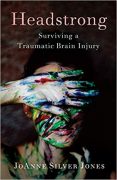Headstrong: Surviving a Traumatic Brain Injury
Headstrong: Surviving a Traumatic Brain Injury
 She didn’t see the hammer. For a fraction of a second JoAnne Jones saw a young black face, framed by a black hoodie, and then she descended into a place where she felt and saw nothing.
She didn’t see the hammer. For a fraction of a second JoAnne Jones saw a young black face, framed by a black hoodie, and then she descended into a place where she felt and saw nothing.
Jones survived this sudden assault by a stranger, but it left her with severe traumatic brain injury (TBI), fractured hands, and PTSD. Headstrong tells the story of how she learned to live with the daily challenges of TBI. It brings the reader into a life traumatized by violence and set in the context of a society full of violence and vocal, visible white supremacists. Woven throughout Jones’s account are the stories of how medical professionals, friends, family, and strangers became a foundation strong enough to hold her during the worst of times, and to give her the buoyancy to find a path toward hope.
Excerpt:
Writing found a fertile place in side of me, a place that was not broken or damaged: a place that, when fed by thoughts and words, grew and blossomed. Writing scratched an itch I didn’t realize I had. It fed a hunger that lay dormant under layers of fatigue and fear I’d acquired since the assault.
I now see writing this book as an act of courage. When I started, I didn’t understand that writing had anything in common with finding the strength to look in a mirror, to be bathed by an indifferent stranger, or to endure endless pain. Through writing, I slowly began to realist that to tell my story, I have to uncover and reveal a great deal of myself. I have to learn to tolerate discomfort and uncertainty. I had to just let things be, and I had to engage and move forward without knowing what the outcome would be.
I didn’t want sympathy or a way out, but I was flooded with self-doubt. Could I really stay with this? What did I have to say that would be of significant value to anyone other than my family and friends? What if I couldn’t manage my feelings? Would what I wrote hurt someone? How would I manage criticism? Questions produced more questions.
There was another layer of trepidation, one I didn’t share with anyone. I knew my story was powerful and dramatic. Bludgeoned with a hammer and lived to tell the tale. But I wanted to write mostly about the happened after the assault. I wanted to help people who have had similar experiences. I was a helper and a teacher, so I wanted to help and teach. Otherwise, why write at all?
**
As is often the case with writing, more ideas stayed in my head than hit the page. After writing several pages or spending an hour on a particular incident, I would start to feel embarrassed. It was that old feeling of taking up too much space, being too visible, saying too much. Who was I to take up so much of people’s time with all these pages? It’s enough already, I’d say to myself, dredging up one of my mother’s frequent comments to my brother and me during our sibling confrontations. “Enough already!” she’d bellow, and we knew it was past to stop whatever we were doing.
Writing exposed me. I had learned to be silent and to fear visibility as a very young child. I understood that the consequences of speaking and being seen were dire.
**
The assault had bombarded every part of me. Theories, beliefs, expectations, competencies, self-perception, feelings – all in disarray. During the time I was desperately seeking explanations for TBI and PTSD, a wonderful psychologist told me that traumatic brain injury was like a filing cabinet that gets thrown in the air. When it lands, some things drop into familiar places and some things star rearranged or lost. Writing was like cleaning out my office, with the added challenge of TBI. I had to go through files, throw some out, stop worrying about the ones that were missing, and find a new way to arrange what was important and what no longer mattered.
I wanted to be silent and not talk to anyone, and I wanted to shout and scream about what happened to me. I wanted to be invisible and was enraged when people didn’t see me as my current, rearranged self. It was easy enough to write about my rage in relation to racism, violence, and the criminal justice system. But uncovering and then exposing my more personal feelings was more difficult. It was painful to write about the roots of wanting to be invisible, the shame that I spent a lifetime trying to keep hidden from almost everyone, and the powerful sanctions against talking about family that were wedged deep inside of me. As I continued to write about the assault, I became increasingly aware of what remained buried.
**
Writing has been my miner’s light, making visible words and pictures in my head…….untangling the fragments and stories of my life was a crucial step in learning how to live with the extreme violence I experienced and all of its ramifications.
I’m often asked, “Is the writing painful? Does it bring up difficult memories? Is it hard to write this? Is it therapeutic?”
Yes.
Yes, there were painful parts, times of confusion and disorganization, long periods where words arrived like precious gems, rare and infrequent, and times when the words flowed in an inchoate stream. The chaos of writing was painful.
Yes, it’s hard. Not just because I’m telling the story of a heinous assault. The whole voyage of writing brings up all kinds of painful memories and experiences. Writing has asked me to push the boundaries of exposure and vulnerability. Writing demands that I not stay invisible, that I keep the assault in my face and find the strength to make others stare at it as well. Writing demands authenticity, telling the truth about what I’ve lost, how I’ve cloaked myself in the protective identity of victim, and how my views of justice and oppression have been altered.
Yes, it’s therapeutic. Not only because I tell and reveal this story, but also in the deep satisfaction of seeing what happened to me in many contexts and at many levels.
Writing, an important character in my story, implores me to find the courage to move forward and the courage to be patient when I can’t move at all.
# # #
 JoAnne Jones is Professor Emeritus at Springfield College in Massachusetts, where she worked for twenty-five years. While at Springfield College, Dr. Jones served as Associate Dean of the School of Human Services and Acting Dean of the School of Social Work. Before Springfield College, she was an Associate Professor at the University of Massachusetts, Amherst, and an Assistant Professor of Social Welfare at the University of Calgary, School of Social Welfare.
JoAnne Jones is Professor Emeritus at Springfield College in Massachusetts, where she worked for twenty-five years. While at Springfield College, Dr. Jones served as Associate Dean of the School of Human Services and Acting Dean of the School of Social Work. Before Springfield College, she was an Associate Professor at the University of Massachusetts, Amherst, and an Assistant Professor of Social Welfare at the University of Calgary, School of Social Welfare.
Her teaching and research focused primarily on social justice issues. In addition to teaching, she has consulted with public and private organizations in relation to diversity, inclusiveness, and excellence.
https://www.facebook.com/joanne.s.jones.9
Category: Contemporary Women Writers, On Writing

























